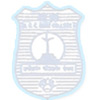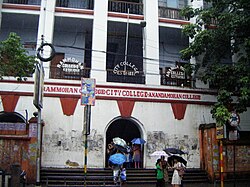Brahmo Samaj is the societal component of Brahmoism, which began as a monotheistic reformist movement that appeared during the Bengal Renaissance.

Medical College, Kolkata, also known as Calcutta Medical College, is a public medical college and hospital located in Kolkata, West Bengal, India. It is one of the oldest existing hospitals in Asia. The institute was established on 28 January 1835 by Lord William Bentinck during British Raj as Medical College, Bengal. It is the second oldest medical college to teach Western medicine in Asia after Ecole de Médicine de Pondichéry and the first institute to teach in English language. The college offers MBBS degree after five and a half years of medical training.
Bengali Brahmos are those who adhere to Brahmoism, the philosophy of Brahmo Samaj which was founded by Raja Rammohan Roy. A recent publication describes the disproportionate influence of Brahmos on India's development post-19th Century as unparalleled in recent times.

The Bengal Renaissance, also known as the Bengali Renaissance, was a cultural, social, intellectual, and artistic movement that took place in the Bengal region of the British Raj, from the late 18th century to the early 20th century. Historians have traced the beginnings of the movement to the victory of the British East India Company at the 1757 Battle of Plassey, as well as the works of reformer Raja Rammohan Roy, considered the "Father of the Bengal Renaissance," born in 1772. Nitish Sengupta stated that the movement "can be said to have … ended with Rabindranath Tagore," Asia's first Nobel laureate.

Prasanna Kumar Roy was an educationist and the first Indian principal of Presidency College, Kolkata.
Pandit Sitanath Tattwabhushan was the official theologian and philosopher of the Sadharan Brahmo Samaj. His hymns still form the basis of Brahmo rites and liturgies.
Rammohan College is an undergraduate and postgraduate college for women in Kolkata, India. It is affiliated with the University of Calcutta. It shares premises with City College, Kolkata and Anandamohan College.
The Brahmo Balika Shikshalaya is a girls' school in Kolkata, West Bengal, India. It is guided by the principles of the Brahmo Samaj movement. It was established on 16 May 1890 by the Sadharan Brahmo Samaj on the 12th anniversary of its foundation.
Deba Prasad Mitra, son of Jyotirindraprasad Mitra (1869–1918), was a renowned clinical pathologist and religious and social worker connected with the Brahmo Samaj. His life and work were greatly inspired and stimulated by the lives of his grandfather Braja Sundar Mitra (1820–1875), the founder of the East Bengal Brahmo Samaj at Dhaka and an inaugurator of the New Age in Dhaka and Eastern Bengal as a whole, and also his mother's grandfather Sib Chandra Deb (1811–1890), a pupil of Henry Louis Vivian Derozio at the Hindu College, the Founder-Secretary of the Sadharan Brahmo Samaj, Kolkata, and pioneer of the modernization of his native village Konnagar, a few kilometers from Kolkata. Devaprasad's father Jyotirindraprasad was a qualified advocate and practiced law for some time, but when he found that one had to resort to falsehood for success in the legal profession, he gave it up and joined the service of the estate of the Tripura Native State at Comilla.

Ananda Mohan College is an undergraduate evening college in north Kolkata. It started in 1961 as the evening branch of City College while Rammohan College started functioning as the morning branch. City College was founded by patriotic Brahmo leader Ananda Mohan Bose. The college is located at 102/1, Raja Rammohan Roy Sarani, Kolkata-700 009. It was one of the City Group colleges administered by Brahmo Samaj Education Society, a registered society, constituted by the Sadharan Brahmo Samaj, Kolkata. From 2017, it became a grant-in-aid college no longer administered by the Brahmo Samaj.

Ananda Mohan Bose was an Indian politician, academician, social reformer, and lawyer during the British Raj. He co-founded the Indian National Association, one of the earliest Indian political organizations, and later became a senior leader of the Indian National Congress. In 1874, he became the first Indian Wrangler of the Cambridge University. He was also a prominent religious leader of Brahmoism and with Sivanath Sastri a leading light of Adi Dharm.
Ramananda College is an institution of higher education situated at Bishnupur, Bankura district, in the state of West Bengal, India. It is the only co-educational degree college at the headquarters of Bishnupur subdivision.

The City College of Commerce & Business Administration is an undergraduate commerce college in Kolkata, India. It is affiliated with the University of Calcutta. It was established in 1961 by the Brahmo Arya Samaj Society, offering only B.COM Honours & Pass with a specialization in Accountancy & Finance/Marketing programmes for undergraduates. It is an Only Boys Evening College.

Heramba Chandra College is popularly known as South City Day. It shares premises with Sivanath Sastri College and Prafulla Chandra College.
Hooghly Mohsin College, established in 1836, is one of the oldest colleges in Chinsurah, in the Hooghly district, West Bengal, India. It offers undergraduate and postgraduate courses in Arts, Commerce and Sciences. It is affiliated to University of Burdwan.

Acharya Girish Chandra Bose College, established in its current form in 1964, is an undergraduate college in Kolkata, West Bengal, India. It is affiliated with the University of Calcutta. It offers undergraduate courses in arts and commerce. Acharya Girish Chandra Bose College was accredited by National Assessment and Accreditation Council (NAAC) in 2011 with a 'B' Grade.

Krishna Kumar Mitra (1852–1936) was an Indian freedom fighter, journalist and leader of the Brahmo Samaj. He is remembered for his contributions to the Swadeshi movement through his journal Sanjibani.

The University College of Science, Technology and Agriculture are two of five main campuses of the University of Calcutta (CU). The college served as the cradle of Indian Sciences by winning the Nobel Prize in Physics in 1930 and many fellowships of the Royal Society London.













